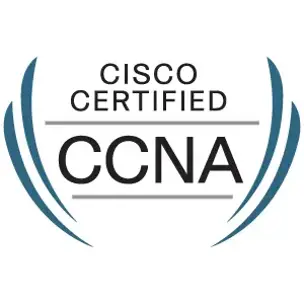CCNA job outlook: Career growth & opportunities for network professionals
Earning your CCNA (Cisco Certified Network Associate) unlocks a gateway to a dynamic and rewarding career. Whether you're a tech enthusiast with a hunger for knowledge or an IT professional looking to advance your Cisco Systems knowledge, the CCNA equips you with the foundational skills and understanding to navigate the world of networking and cybersecurity.
How relevant is the CCNA job outlook in 2025? The need for skilled network engineers and cybersecurity specialists remains strong, and the CCNA is a sought-after credential in the eyes of employers, especially those that use Cisco equipment. According to Cisco, networked devices are estimated to grow to 50 billion, and technical certifications can help you stand out in a networked world.
In this article, we'll explore CCNA career opportunities in the broader cybersecurity job market, analyze IT networking job trend, and offer practical tips for navigating the path to a successful networking career trajectory.

Earn your CCNA, guaranteed!
The current state of CCNA certification
The CCNA you knew before 2020 has gone through significant changes. In February of that year, Cisco streamlined its offerings, consolidating many specializations into one powerful exam: the 200-301 CCNA. The exam received another important update in August 2024 with the release of CCNA v1.1, which added emerging topics like generative AI, cloud network management, and machine learning to reflect the evolving demands of modern networking.
The current exam focuses on fundamental skills like:
- IP connectivity
- Network access
- Network fundamentals
- IP services
- Security fundamentals
- Automation and programmability
The August 2024 v1.1 update expanded the exam to include:
- Generative AI applications in network monitoring
- Cloud network management
- Machine learning for network operations
- Enhanced automation tools like Ansible and Terraform
- Advanced Spanning Tree Protocol features
This broader scope reflects the reality of modern networking jobs. Gone are the days of siloed specializations. Today's networking professionals need a well-rounded skillset to handle the diverse demands of dynamic IT environments. The CCNA proves you have essential networking skills and can be your entry point into professional networking.
And while the CCNA is not a cybersecurity certification per se, it does lay the critical foundation for success in this growing field. Networking knowledge is fundamental to understanding and securing IT systems. You have to know the ins and outs of computer networking before cybersecurity. It's a cart and horse thing. So whether you're considering building secure networks or hunting down cyber threats, a CCNA is a valuable first step.
Understanding networks is essential for configuring firewalls and employing intrusion detection systems.
CCNA job market trends for 2025
The CCNA job market looks exceptionally bright, fueled by the unending surge in demand for network professionals and dynamic market trends. The Cisco certification job market continues to expand as organizations recognize the value of standardized networking expertise. Here are some of the trends driving CCNA job growth:
- ISC2 reports a current global cybersecurity workforce shortage of approximately 4.7 million positions, with more than 540,000 of those in North America.
- CyberSeek shows nearly 200,000 online job listings for networking, and CCNA and CCNP are the most commonly listed certifications in those job listings.
- The rise of cloud computing, IoT, and 5G is reshaping networks, creating a need for agile professionals who understand traditional and cutting-edge technologies.
The CCNA is a key pathway to this market — when you understand how a network functions, you become a valuable asset in identifying and stopping threats.
CCNA without experience: Breaking into the field
The CCNA job market might seem daunting if you've conquered the CCNA but lack experience. Don't worry about all the job postings that tell you "experience required." Employers value the CCNA, even without real-world experience. It demonstrates your dedication, technical aptitude, and understanding of networking fundamentals.
Instructor Wilfredo Lanz explains how beginners should approach the CCNA in this episode of Cyber Work.
You can bridge this experience gap with CCNA certification training, as well as:
- Hands-on labs: Platforms like Infosec Skills offer virtual labs where you can build and manage network simulations, replicating real-world scenarios.
- Your home lab: If you have the equipment, you can set up a primary home network, configure devices, and experiment with protocols like routing and switching. You can also practice with network simulators and emulators, like GNS3.
- Contributions to open source: Several open-source networking projects, like GNS3 or OpenWRT, welcome contributions.
- Volunteer work: Offer your skills to non-profit organizations or community initiatives that rely on strong networks.
Read these success stories for a few examples of what CCNA holders have said:
- "The CCNA, combined with a little networking, can get you an IT job with minimal or no previous experience. I know this because that's what happened to me." - TechExams
- "CCNA helped me get my first job, and I didn't have any experience in anything" - TechExams
- "I had no IT experience and got a job the week after earning my CCNA." - Reddit
Network technicians, help desk specialists, and junior network administrators are common entry points for CCNA holders. To land these roles, highlight your CCNA, showcase your lab work and projects, and emphasize your eagerness to learn and grow. Network with professionals, attend industry events and showcase your enthusiasm for the field. Confidence and a proactive attitude can compensate for limited experience.

Earn your CCNA, guaranteed!
Salary and career progression for CCNA professionals
The CCNA can be your launchpad to a diverse and financially rewarding journey in networking and cybersecurity. The average U.S. salary for CCNA holders is around $93,000, based on the analysis found in Infosec's Cybersecurity salary guide.
The CCNA can lead to a wide variety of roles, so it's important to understand that salary can vary quite a bit based on role, experience, location and other factors. For comprehensive details on regional variations and experience-based salary ranges, check out our CCNA salary information.
With a CCNA, you don't have to stick to a single career track. The network of possibilities is as diverse as the networks themselves. Here are just a few CCNA job roles you can explore:
- Network administrator: Dive into the hands-on world of managing and troubleshooting networks, ensuring smooth operations and data flow. Picture yourself as a complex information orchestra conductor, keeping the music in perfect harmony.
- Cloud networking specialist: Master the art of secure cloud environments, designing and managing virtual networks that power the digital age. Imagine yourself building intricate digital bridges that connect data across the globe, powering everything from streaming services to financial transactions as a cloud engineer.
- Cybersecurity analyst: Embrace the cybersecurity frontier as a cybersecurity analyst, identifying and mitigating threats to keep networks safe. Think of yourself as a digital detective, tracking malicious actors and safeguarding valuable information. This entry-level career has strong earning potential, setting you down the path to higher-paying Cisco network engineer careers. The median cybersecurity salary is $134,800.
- Network engineer: Climb the ladder to network engineer, where you'll hone your expertise, take on strategic network design, and implement projects. In this role, you shape how information flows through our connected world.
Although the lines between IT and cybersecurity can be blurry, you can generally choose between a long-term focus on the infrastructure side, with roles like network architect or network manager, or roles on the cybersecurity side, like security architect or security manager. Understanding the CCNA career path helps you make strategic decisions about your networking career trajectory and network engineering field advancement.
CCNA in the context of cybersecurity
In the IT and cybersecurity landscape, the CCNA plays a crucial role in the cybersecurity landscape. It's the foundation upon which robust security measures are built. Networking expertise provides the essential groundwork for understanding how data moves through systems and where vulnerabilities may exist.
The CCNA shows you have a working knowledge of computer networks, which can naturally lead to cybersecurity certifications like:
- Cisco Cybersecurity Associate: This natural next step after CCNA builds upon your networking knowledge, equipping you with essential cybersecurity skills like threat detection, incident response, and security analysis. This combination is a highlight of our Cisco CCNA Associate and Cybersecurity Associate Training Boot Camp, creating well-rounded cybersecurity professionals with dual certifications.
- Vendor-neutral certifications: Certifications like the CompTIA Security+ complement the CCNA's networking focus by providing broader cybersecurity knowledge and best practices. The synergy between understanding networks and applying general security principles makes you a highly valuable professional.
Firewalls and intrusion detection systems are essential for defending an organization, but understanding the underlying network allows them to function effectively. A cybersecurity professional needs to know the network inside and out to spot vulnerabilities, deploy defenses, and respond to threats.
With a CCNA, you'll grasp:
- Network protocols and vulnerabilities: Knowing how communication flows and where weaknesses lie is crucial for identifying potential attack vectors and implementing targeted security measures.
- Network troubleshooting: Security incidents often manifest in network issues. Identifying and resolving these issues quickly requires a deep understanding of network operations.
- Security tools and their integration: Many security tools rely on network data and analysis. You can deploy and use these tools more effectively with a strong network foundation.
For more on what you'll learn as a CCNA, read our CCNA exam and topics. The CCNA equips you to understand the language of networks, enabling you to build a more robust, more resilient network defense.

Earn your CCNA, guaranteed!
Preparing for the future: Enhancing your CCNA skills
Getting your CCNA is a great achievement, but remember, in IT, your learning never ends. The pace of technological advancement demands continuous learning and skill enhancement. So, how can you ensure your CCNA knowledge remains sharp and prepares you for the future of networking and cybersecurity?
If you earned your CCNA before August 2024, you'll want to familiarize yourself with the v1.1 updates, which added critical skills in AI-driven network operations, cloud management platforms, and infrastructure-as-code tools. While your certification remains valid, understanding these emerging technologies will keep you competitive in today's job market.
Here are some ways you can stay ahead of the curve:
- Read industry publications and news: Follow tech blogs, podcasts, and websites like Network World, Network Computing, and Infosec Institute to stay abreast of emerging trends, new protocols, and innovative technologies.
- Engage in online communities: Participate in online communities like Reddit's r/networking and forums like TechExams to share knowledge, discuss challenges, and collaborate on projects.
- Attend industry events: Conferences, workshops, meetups, and webcasts provide valuable opportunities to network with peers and learn from experts.
Here is how you can build your skills:
- Dive deeper into Cisco certifications: The CCNA is just the beginning. Consider pursuing advanced Cisco certifications like CCNP or specialized tracks like Cybersecurity Associate or DevNet Associate to broaden your skillset and target specific career paths.
- Explore vendor-neutral certifications: Certifications like CompTIA's Network+ or Security+ offer vendor-neutral proficiency in networking and security skills, complementing your CCNA knowledge and increasing your market value.
In the IT field, new technologies emerge and evolve constantly. The key to success is embracing a growth mindset and understanding the CCNA certification requirements as you plan your professional development.
CCNA job outlook conclusion
As we move through 2025, the outlook for CCNA professionals is brighter than ever. The August 2024 v1.1 update has positioned the CCNA as more relevant than ever, incorporating AI, cloud networking, and automation skills that today's employers demand. The world is becoming more connected, demanding skilled individuals who can navigate the networks that provide the infrastructure for our work and life. The CCNA is your passport to this exciting landscape, offering strong CCNA employment prospects across multiple industries.
Embrace the challenge, conquer the CCNA exam, and join the ranks of those who build, manage and secure the digital infrastructure of our world. And if you're a current CCNA professional, never stop learning. Explore new technologies, pursue advanced certifications, and develop the growth mindset that will propel you to the forefront of your profession.








